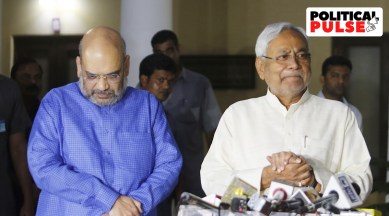Amit Shah coming to Bihar, Nitish invokes the new king among castes — Emperor Ashoka
JD(U) leader says people "who had no role in freedom struggle" using Ashoka to wean away castes; in UP and Bihar, the 3rd-century Mauryan king now celebrated as "a grand OBC (Kushwaha) face"

INTO HIS 2,320th or so birth year, and into the final year before the next Lok Sabha elections, Emperor Ashoka is back on political agenda. A year after a scramble for caste votes in Uttar Pradesh saw a kerfuffle over the Mauryan king’s caste, the issue has surfaced in Bihar.
With Union Home Minister Amit Shah set to visit Sasaram in Bihar on April 2, Chief Minister Nitish Kumar took a dig Thursday. Addressing a function in Patna, Nitish said, “There are people who are trying to foment tension in society for political gains. Beware of them. In a few days, someone from Delhi will come and try to mislead you in the name of Samrat Ashoka.”
The grandson of Maurya dynasty founder Chandragupta, Ashoka ruled over most of what is now called India between 268 BCE and 232 BCE. Not surprisingly, the BJP was one of the first to recognise the political value of Ashoka. In 2015, the Bihar BJP marked his 2320th birth anniversary, and the party’s government at the Centre issued a postal stamp on him.
Soon after, there were others claiming him as their own, particularly the OBC Kushwaha community, as well as backward class leaders across parties — the BJP, JD(U) and RJD. A senior Bihar leader from a party with a socialist background who does not want to be named told The Indian Express earlier that Ashoka was “a grand OBC face and voice of the subaltern”.
In January 2022, a tussle to appropriate Ashoka was kicked off when Sahitya Akademi Award winner, former IAS officer and BJP worker Daya Prakash Sinha said in an interview to Navbharat Times: “While doing research on Samrat Ashok, I was greatly surprised at several similarities between him and Mughal Emperor Aurangzeb. Both had committed many sins in their early days and later resorted to over-religiosity to hide their sins so that people were digressed towards religion and their sins are overlooked.” Sinha got the Sahitya Akademi Award for his play Samrat Ashoka.
He also commented on Ashoka’s looks, saying that several Buddhist works called him “very ugly”.
Three Kushwaha leaders, from three different parties — Panchayati Raj Minister Choudhary of the BJP, then a JD(U) leader and now a rebel, Upendra Kushwaha, and RJD national spokesperson Subodh Mehta — were the first to jump to the Emperor’s defence. The Kushwahas, the second most populous caste after the Yadavs in Bihar, claim that they are direct descendants of the Mauryas.
This caste group is being aggressively wooed by the BJP in Bihar. At 8 per cent of Bihar’s population, they are also an essential part of the JD(U)’s OBC base. The BJP and RJD too have a good number of Kushwaha leaders.
Soon, most top Bihar leaders had got into the matter — from the BJP’s Sushil Kumar Modi, a former deputy CM and Rajya Sabha MP, to Sanjay Jaiswal, the BJP’s state president, and former CM Jitan Ram Manjhi.
With elections in nearby UP ahead, and the BJP fearful of its Maurya vote there after the defection of Swami Prasad Maurya to the SP, the BJP even filed an FIR against Sinha “for hurting people’s sentiments”, and insisted Sinha had nothing to do with the party. Manjhi, the BJP’s ally JD(U), and the RJD demanded that his awards be taken back.
(With inputs from PTI)